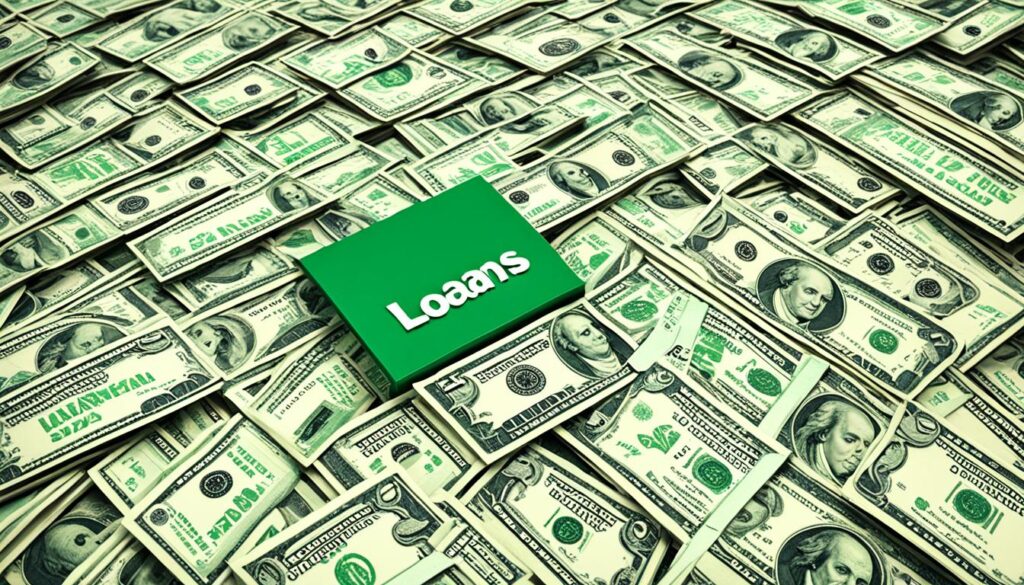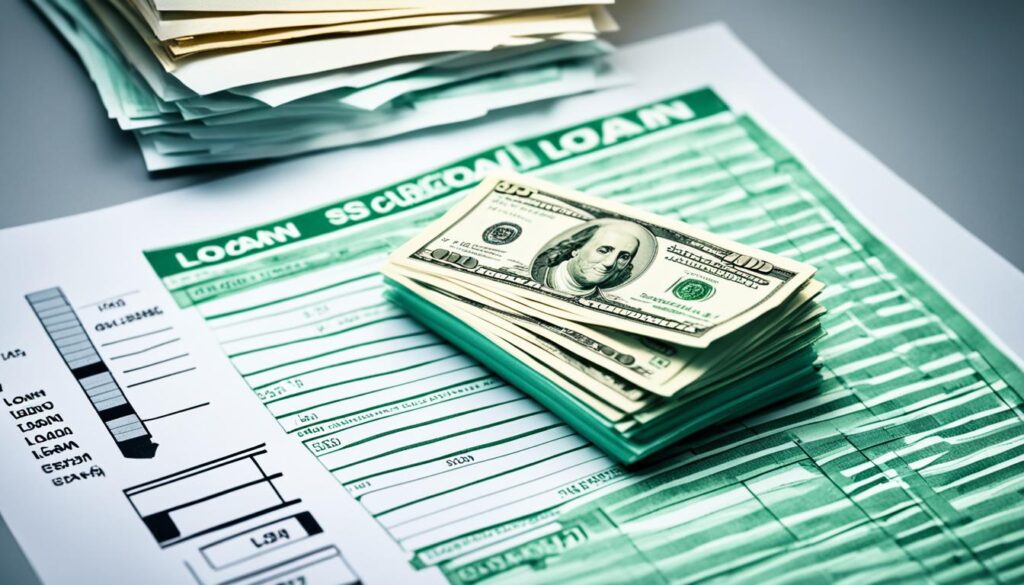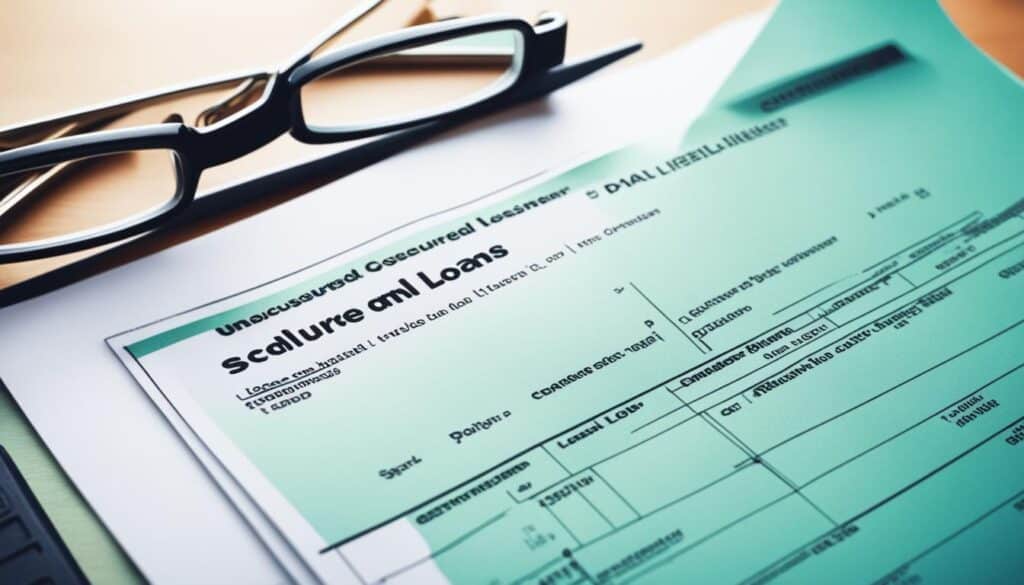Small business owners often struggle to find the right funding to grow and keep their businesses running. They look at secured and unsecured small business loans as options. Knowing the main differences between these loans can help entrepreneurs pick the best one for their needs.
Key Takeaways
- Secured small business loans require collateral, while unsecured loans do not.
- Secured loans usually have lower interest rates and you can borrow more money. But, your business assets could be at risk.
- Unsecured loans are given based on your creditworthiness and don’t need collateral. But, they often have higher interest rates.
- The choice between a secured or unsecured loan depends on your business’s financial history, assets, and your credit score.
- Knowing the good and bad points of each loan type can help small business owners make the best financing choice.
Understanding Secured and Unsecured Small Business Loans
There are two main types of loans for small businesses: secured and unsecured. Knowing the differences helps entrepreneurs make the right choice for their business and finances.
Secured Business Loans and Collateral Requirements
Secured business loans need collateral like equipment, inventory, or real estate. This collateral makes sure the loan gets paid back. If the borrower can’t pay, the lender takes the collateral to get their money back.
Unsecured Business Loans and Personal Guarantees
Unsecured business loans don’t need any collateral. But, lenders might ask for a personal guarantee. This means the borrower is personally responsible for paying the debt if the business can’t. The lender can then go after the borrower’s personal assets.
“Securing a business loan with collateral can provide access to lower interest rates and higher borrowing limits, but it also carries the risk of losing personal assets if the business fails.”
Choosing between a secured or unsecured small business loan depends on the business’s needs. Entrepreneurs should weigh the pros and cons of each type to find the best fit for their financing needs.
Key Differences Between Secured and Unsecured Loans

Choosing between secured and unsecured loans for small businesses is crucial. The main differences are in loan terms, interest rates, and how much you can borrow.
Secured Loans: These loans need you to offer something valuable as collateral, like property or equipment. This makes the loan safer for the lender. So, secured loans usually have lower interest rates and higher borrowing limits than unsecured loans.
Unsecured Loans: Unsecured loans don’t need collateral. The lender looks at your credit and history to decide. This means unsecured loans often have higher interest rates and lower borrowing limits.
| Loan Type | Interest Rates | Borrowing Limits |
|---|---|---|
| Secured Loans | Lower | Higher |
| Unsecured Loans | Higher | Lower |
Applying for a loan can be different for secured and unsecured loans. Secured loans take longer and need more paperwork because of the collateral check. Unsecured loans are usually faster to apply for and get approved.
“The key to understanding the differences between secured and unsecured loans is recognizing the impact of collateral on the lender’s risk assessment.”
Knowing these differences helps small business owners pick the right loan for their needs and likes.
Advantages of Secured Small Business Loans
Securing a small business loan has many benefits for entrepreneurs. One big plus is the chance for lower interest rates. By offering collateral, the risk seems lower to the lender. This can lead to better interest rates than loans without security.
Secured loans also let you borrow more money. The collateral acts as a safety net for the lender. This means you can get a bigger loan for things like growing your business, buying new equipment, or making big investments.
“Securing a small business loan can open up new opportunities for growth and investment that may not have been possible with an unsecured loan.”
But, you must be ready to risk your assets as collateral. If you can’t pay back the loan, the lender could take your assets. Still, the benefits of secured small business loans make them a good choice for many entrepreneurs looking to fund their businesses.
Disadvantages of Secured Small Business Loans
Secured small business loans can offer lower interest rates and let you borrow more money. But, they also have big drawbacks that you should think about. The main issue is you must put up collateral, which can put your business at risk.
If your business can’t pay back the loan, the lender can take your collateral. This could mean losing important things like equipment, buildings, or stock. These are key to running and succeeding in your business. The risk of losing these assets is a big worry that can hurt your business’s financial health and future.
Also, making sure the collateral is ready can make getting the loan harder and slower. You’ll need to give lots of details about your assets, get them appraised, and make sure they meet the lender’s standards. This can make getting a small business loan harder and take up more of your time.
| Disadvantage | Description |
|---|---|
| Collateral Risk | If the business can’t pay back the loan, the lender can take the collateral. This could be important things like equipment, buildings, or stock. |
| Appraisal and Securing Process | Getting the collateral ready can make the loan process more complicated and slow. |
Choosing a secured small business loan should be a careful decision. Think about the risks and what your business really needs. Entrepreneurs should weigh the long-term risks of using their assets as collateral against the possible benefits.
Advantages of Unsecured Small Business Loans

Unsecured small business loans have many benefits for entrepreneurs. One big plus is the absence of collateral requirements. Unlike secured loans, you don’t need to offer up valuable assets as security. This is great for business owners who don’t have much to offer or don’t want to risk losing their assets.
Another big plus is the fast funding process. Without the need to value and secure collateral, getting an unsecured loan is quicker. This is key for businesses that need cash fast to grab opportunities or fix financial issues.
- Unsecured loans don’t need collateral, making them open to more business owners
- The process for getting unsecured loans is usually quicker than for secured ones
- Unsecured loans are good for businesses without assets to use as collateral
But, remember, unsecured loans have their downsides. They often have higher interest rates and lower borrowing limits. This is because lenders take more risk without collateral. Think carefully about the pros and cons before deciding if an unsecured small business loan is right for you.
Disadvantages of Unsecured Small Business Loans
Unsecured small business loans are quick and easy to get. But, they have some downsides that business owners should think about. The main issues are higher interest rates and stricter credit requirements.
Since there’s no collateral for the loan, lenders take more risk. They charge higher interest rates to make up for this risk. This makes unsecured loans more costly for borrowers over time. Also, unsecured loans often ask for a personal guarantee. This means the business owner is personally responsible for paying back the debt. If the business can’t pay, the lender can go after the owner’s personal assets.
Unsecured loans usually have lower borrowing limits than secured loans. This can be a problem for businesses needing a lot of money for growth or expansion.
| Disadvantage | Explanation |
|---|---|
| Higher interest rates | Lenders charge more because unsecured loans are riskier. |
| Stricter credit requirements | For unsecured loans, lenders want stricter credit requirements since they don’t have collateral. |
| Personal guarantee | Often, unsecured loans require a personal guarantee, making the borrower personally responsible for the debt. |
| Lower borrowing limits | Unsecured loans usually have lower borrowing limits than secured loans. |
When looking at financing options, small business owners should think about the disadvantages of unsecured loans.
Small Business Loans: Secured or Unsecured?

Choosing between a secured or unsecured small business loan depends on your business’s needs. You should think about your credit score, what assets you have, and what loan terms you want, like interest rates and borrowing limits.
If your credit score is low or you want better loan terms, secured loans might be best. They usually have lower interest rates and let you borrow more money. But, you must offer something valuable as collateral, like equipment or property, which the lender can take if you don’t pay back.
Unsecured loans are good for businesses without assets to use as collateral or those needing quick cash. They don’t need collateral but have higher interest rates and lower borrowing limits. Sometimes, you might need to personally guarantee the loan, making you liable for repayment if the business can’t.
Deciding between a secured or unsecured loan should be based on your business’s financial health and goals. Think about the pros and cons of each type to find the best match for your business needs.
“The right financing option can make or break a small business. Carefully considering the trade-offs between secured and unsecured loans is crucial for long-term success.”
When to Consider a Secured Small Business Loan
Secured small business loans are a smart pick in certain situations. If your business has a low credit score or is new, a secured loan can offer better interest rates and higher borrowing limits. The collateral makes your loan riskier for the lender, which can make your loan more likely to be approved.
Also, if your business owns valuable things like equipment, real estate, or inventory, you can use them as collateral. This can lead to better loan terms than an unsecured loan. Secured loans are also good if you need a bigger loan or want to pay it back over a longer time. The collateral helps cover these bigger financial needs.
- New businesses or those with lower credit scores can get better loan terms with a secured loan.
- Businesses with lots of assets can use these as collateral for better financing options.
- Secured loans work well for bigger loans or longer repayment plans.
“Secured loans can be a game-changer for small businesses that need access to more competitive financing options.”
Think about your business’s needs and what assets you have before deciding on a secured small business loan. This can help you figure out if it’s the best way to support your growth and success.
When to Consider an Unsecured Small Business Loan

Choosing an unsecured small business loan can be smart for your business. It’s great if your business doesn’t have assets for collateral or if you don’t want to risk your personal assets. This type of loan gives you the funds you need without extra requirements.
Unsecured loans are also ideal for when you need fast funding. They have a quicker application and approval process than loans that require collateral. This makes them a great choice when you’re in a hurry.
For businesses with strong credit scores, unsecured loans can be a smart pick. They often come with lower interest rates and better terms. This means you can get financing without needing collateral, which saves you money.
“An unsecured small business loan can be a game-changer when you need quick access to capital without putting your personal assets on the line.”
When deciding between a secured or unsecured loan, think about what your business needs and its financial situation. Understand the pros and cons of each option. This way, you can choose the best loan that meets your when to choose unsecured loans, no collateral, fast funding, credit score needs.
Also Read: What Are The Options For Student Loan Forgiveness?
Conclusion
In the world of small business financing, both secured loans and unsecured loans have their own benefits and things to consider. Secured small business loans usually have lower interest rates and let you borrow more money. But, you must offer valuable assets as collateral.
On the other hand, unsecured small business loans don’t need collateral. Yet, they often have higher interest rates and lower borrowing limits.
Choosing between a secured or unsecured loan depends on your business’s financial needs, credit score, and what assets you have. Knowing the main differences between these loan types helps small business owners make a smart choice. This choice should match their long-term goals and financing needs.
Both secured and unsecured small business loans have their good points. The best choice depends on your business’s specific situation and financial goals. By looking at the pros and cons of each option, entrepreneurs can find the right financing to help their business grow and reach their dreams.
FAQs
Q: What is the difference between secured and unsecured small business loans?
A: Secured small business loans require collateral, such as assets or property, to back the loan, while unsecured loans do not require collateral but may have higher interest rates.
Q: How can I determine the best small business loan for my business needs?
A: To find the best small business loan, consider factors such as the loan amount, interest rate, terms, loan options, and whether the lender offers business lines of credit or term loans.
Q: What is a business line of credit and how does it differ from a term loan?
A: A business line of credit is a revolving credit option where you can borrow up to a certain limit, repay, and borrow again, while a term loan provides a lump sum amount with a fixed repayment schedule.
Q: How can I use a business loan calculator to estimate my loan payments?
A: By inputting details such as loan amount, interest rate, and term, a business loan calculator can help you estimate monthly payments and total interest cost.
Q: What role does the Small Business Administration (SBA) play in providing small business loans?
A: The SBA guarantees certain small business loans, making them more accessible to businesses that may not qualify for traditional financing.
Q: What are some common factors that lenders consider when evaluating a small business loan application?
A: Lenders typically consider factors such as credit history, business cash flow, years in business, loan amount, business type, and the purpose of the loan.
Q: What are the steps involved in applying for a small business loan?
A: The application process for a small business loan typically involves submitting documentation such as financial statements, business plans, and personal and business credit history.
Q: What are the different types of small business loans available to business owners?
A: Business owners can choose from options such as term loans, business lines of credit, SBA loans, equipment loans, commercial real estate loans, and working capital loans to meet their specific financing needs.
Source Links
- https://www.bankrate.com/loans/small-business/secured-vs-unsecured-business-loan/
- https://business.bankofamerica.com/resources/secured-vs-unsecured-business-loan.html
- https://www.nerdwallet.com/article/small-business/small-business-loan-secured-or-unsecured